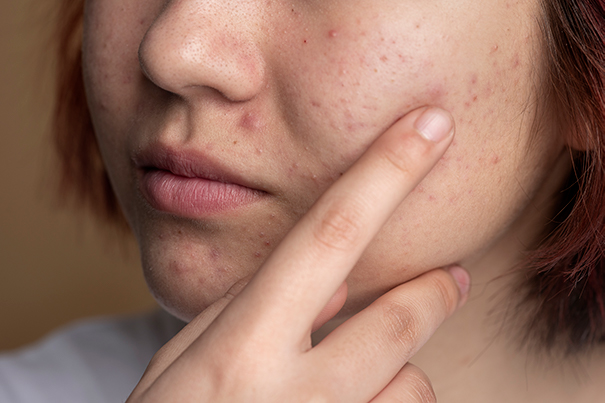Introduction
Acne scars can be frustrating reminders of past breakouts, affecting both confidence and self-esteem. If you’re searching for a solution, you’ve likely come across tretinoin cream, a popular treatment in the world of skincare. But does it really help with acne scars? In this article, we’ll explore how tretinoin works, its effectiveness on different types of scars, and tips for using it safely. By the end, you’ll have a clear understanding of whether tretinoin cream could be the answer to smoother, healthier skin.
Understanding Acne Scars
Acne scars form when severe acne damages the deeper layers of skin, leading to changes in texture and tone. They typically fall into two categories:
- Atrophic Scars: Depressed scars caused by a loss of tissue, including boxcar, icepick, and rolling scars.
- Hypertrophic Scars: Hypertrophic scars are elevated scars brought on by an overabundance of collagen.
The type of scar determines the treatment approach, as not all methods work equally on all scars.
What is Tretinoin Cream?
Tretinoin, a derivative of vitamin A, is a retinoid that has been a cornerstone of dermatological treatments for decades. Initially developed to combat acne, it works by accelerating cell turnover, increasing collagen production, and reducing inflammation. Over time, these processes help improve skin texture and reduce discoloration, making tretinoin a versatile solution for various skin concerns.
How Does Tretinoin Work on Acne Scars?
Tretinoin is not a magic wand that erases scars overnight, but its long-term effects can be transformative. Here’s how it helps:
- Stimulates Collagen Production: Collagen is essential for maintaining skin’s elasticity and structure. By boosting collagen, tretinoin helps fill in atrophic scars, making them less noticeable.
- Encourages Skin Cell Renewal: Tretinoin speeds up the shedding of old, damaged skin cells and promotes the growth of new ones. This gradual exfoliation helps smooth out uneven skin texture caused by scars.
- Reduces Hyperpigmentation: Acne scars are often accompanied by post-inflammatory hyperpigmentation (PIH). Tretinoin lightens dark spots, evening out skin tone.
- Improves Skin Resilience: With consistent use, tretinoin strengthens the skin barrier, making it more resilient to future damage.
Types of Acne Scars Tretinoin Can Treat
While tretinoin is effective for many skin concerns, its efficacy varies depending on the type of acne scar:
- Atrophic Scars: Tretinoin works well on shallow atrophic scars, gradually smoothing their appearance. For deeper scars, combining tretinoin with other treatments like microneedling or fillers may be more effective.
- Post-Inflammatory Hyperpigmentation (PIH): Tretinoin excels in treating PIH by fading discoloration over time.
- Hypertrophic Scars: Tretinoin has limited impact on raised scars, as these require more specialized treatments like corticosteroid injections.
How to Use Tretinoin Cream for Acne Scars
To maximize the benefits of tretinoin and minimize side effects, follow these steps:
- Start Slowly: Begin with a lower concentration (e.g., 0.025%) and apply it every other night. Gradually increase frequency as your skin adapts.
- Cleanse and Dry Your Skin: Wash your face with a gentle cleanser and pat it dry before applying tretinoin. A clean surface enhances absorption.
- Use a Pea-Sized Amount: A little goes a long way. Apply a small amount evenly across your face or directly on scarred areas.
- Moisturize: Tretinoin can be drying, especially during the initial weeks. Keep your skin hydrated by using a non-comedogenic moisturiser.
- Apply Sunscreen Daily: Tretinoin increases skin sensitivity to UV rays, making sunscreen essential to prevent further damage and discoloration.
Potential Side Effects
Like any skincare product, tretinoin comes with potential side effects, especially during the adjustment period. These may include:
- Redness
- Peeling
- Dryness
- Sensitivity
These side effects usually subside after a few weeks of consistent use.To change your treatment strategy if irritation continues, see a dermatologist.
Combining Tretinoin with Other Treatments
For optimal results, tretinoin is often combined with complementary treatments:
- Chemical Peels: Accelerate the removal of damaged skin layers.
- Microneedling: Stimulates deeper collagen production.
- Laser Therapy: Targets deeper scars and pigmentation.
- Hyaluronic Acid: Enhances hydration and plumps up scarred areas.
Discuss these options with a skincare professional to create a tailored treatment plan.
Expected Results and Timeline
Tretinoin is a long-term commitment. Visible improvements typically take 12–24 weeks, with continued use yielding even better results. Patience is key, as the gradual nature of tretinoin ensures safer, more sustainable changes.
Tips for Success
- Be Consistent: Regular use is crucial for achieving noticeable results.
- Stay Hydrated: Drink plenty of water and use hydrating skincare products to counteract dryness.
- Avoid Overuse: More isn’t always better; stick to recommended amounts to avoid irritation.
- Consult a Professional: A dermatologist can guide you on the best tretinoin regimen for your skin type and concerns.
Frequently Asked Questions
- Can tretinoin remove scars completely?
Tretinoin can significantly reduce the appearance of scars, but it may not eliminate them entirely. Combining it with other treatments often enhances results. - How long does it take for results to appear?
Most users notice improvements in 12–24 weeks, with continued benefits over time.
- Can tretinoin be used on sensitive skin?
Yes, but start with a lower concentration and apply it less frequently to minimize irritation. - Is tretinoin safe for all skin tones?
Tretinoin is generally safe for all skin tones, but individuals with darker skin should monitor for potential hyperpigmentation and consult a dermatologist if issues arise. - Can I use tretinoin with other acne treatments?
Yes, but introduce products gradually and avoid combining tretinoin with harsh exfoliants or strong acids.
Conclusion
Tretinoin cream is a powerful ally in the fight against acne scars, offering gradual but lasting improvements in skin texture and tone. While it requires patience and proper care, its benefits can be transformative when used correctly. For those dealing with persistent scars, consulting a dermatologist and incorporating tretinoin into a well-rounded skincare routine could be the first step toward clearer, more confident skin.
